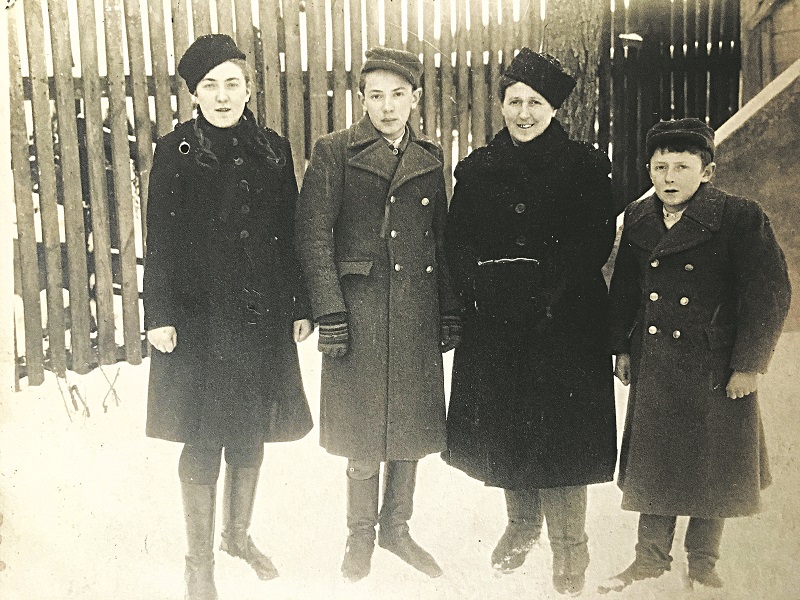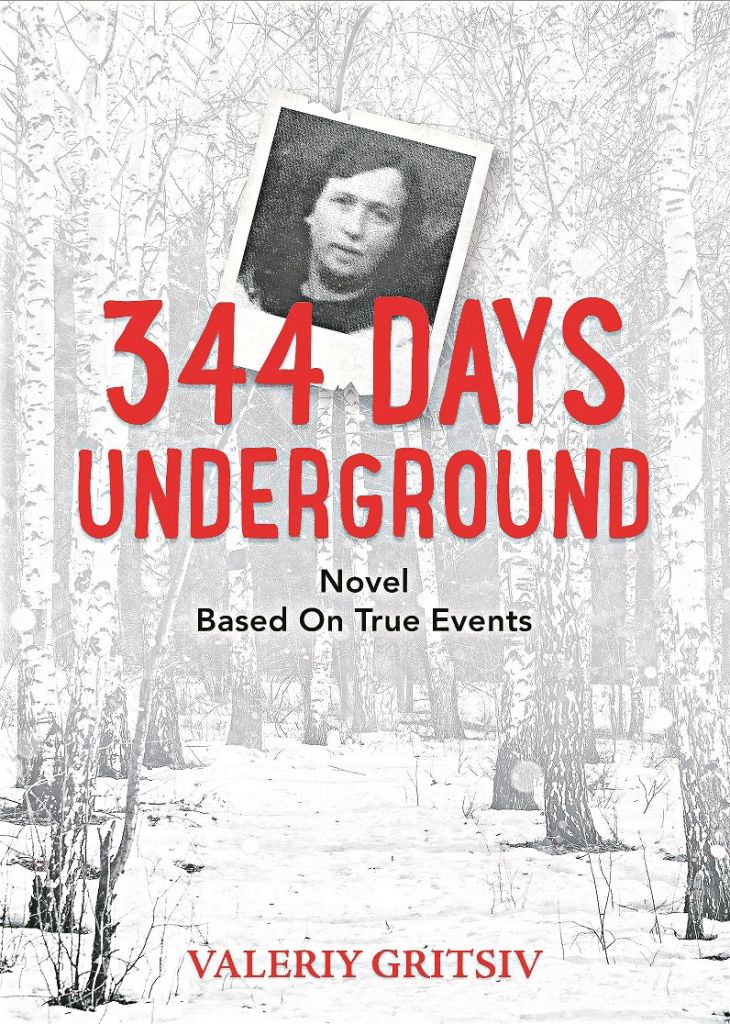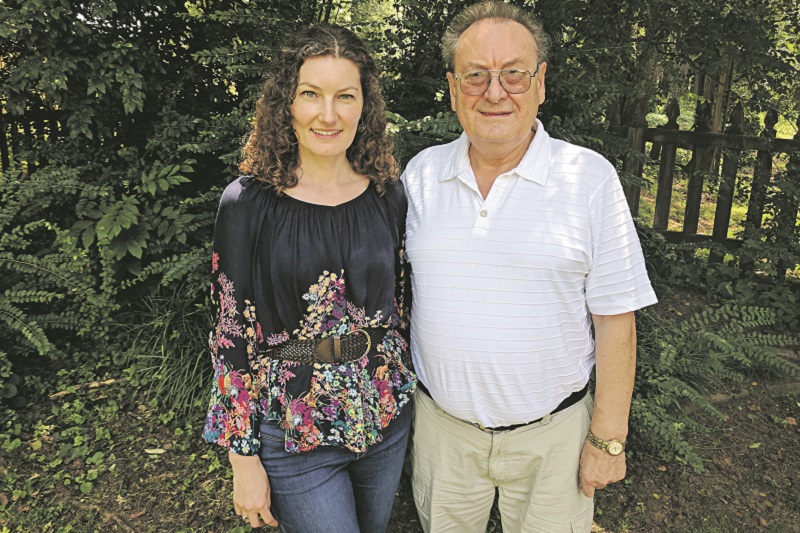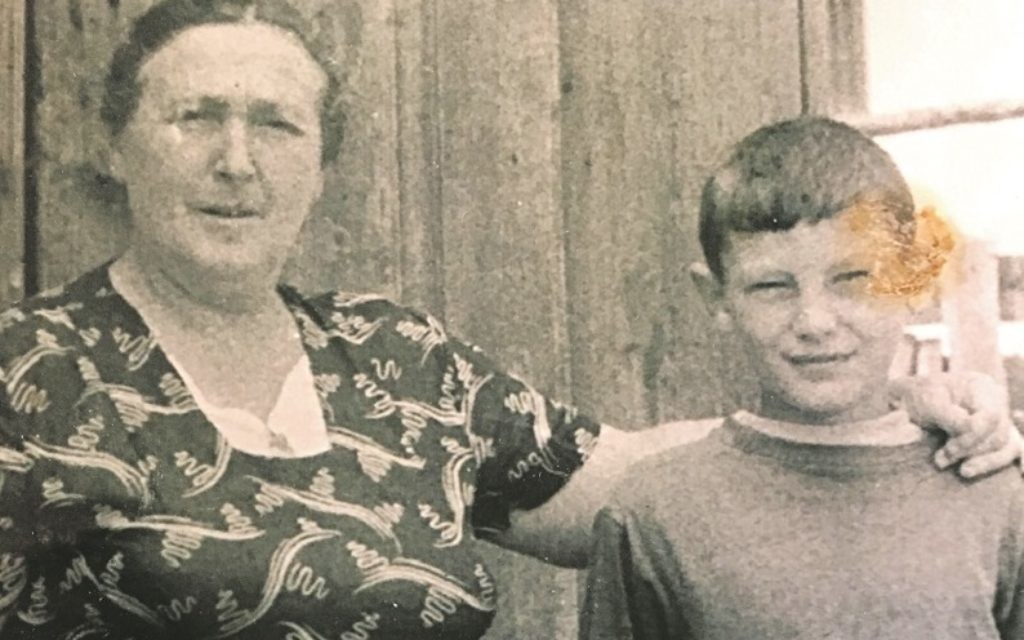344 Days Underground: ‘Who would ever believe we lived in a cave?’
Francine Wolfisz speaks to Valeriy Gritsiv, grandson of Etcia Goldberg, who hid from the Nazis with 37 other Jews in an underground cave
Glimpsing daylight for the first time in nearly a year, little Mania Goldberg desperately covered her eyes with her hands, while her 75-year-old grandmother, overwhelmed by the bright sun, simply fainted to the ground.
For 344 days, they had survived Nazi persecution by living in total darkness inside a remote cave in western Ukraine known as Popowa Yama, The Priest’s Grotto, alongside 36 other Jews.
Remarkably, Mania’s widowed mother, Etcia, was the only woman to risk her life by leaving the cave each day alongside the men to hunt for supplies.
Get The Jewish News Daily Edition by email and never miss our top stories Free Sign Up
Now Etcia’s incredible bravery has been brought to light for the first time in 344 Days Underground, a novel written by her grandson, Valeriy Gritsiv, based on her recollections.
The story of Popowa Yama only surfaced in 1993 after Christos Nicola, a young speleologist from New York, came across a gypsum cave near the village of Stilkivtcy and found evidence that people had once lived there.
After researching Popowa Yama for more than ten years, he traced one of the few remaining survivors, resulting in a National Geographic article, a book and documentary about their experiences.
However, the story of what had happened to Etcia was not included and Gritsiv resolved that her role in this remarkable tale of survival was never forgotten.
Gritsiv, who lives near Atlanta, Georgia with his daughter, Elina, fondly recalls his grandmother as “the most amazing woman I ever met.”
Speaking with a discernible Ukrainian accent, he explains: “The story was told in my house many, many times, especially in my childhood. But there was never a discussion outside the family, because they thought who would ever believe they had lived in a cave for a year?
“Etcia was very brave, a fighter actually, and someone unafraid to take risks.”

She had assumed her position as head of the family when her husband, Chaim, tragically died from leukaemia just two weeks before the outbreak of the Second World War.
As a young widow, she had to keep running the family store, as well as look after her children, Marek, three, Dunia, eight and Mania (Gritsiv’s mother), 11.
But in the face of Nazi persecution, including mass shootings of Jews close to where they lived, Etcia realised she was running out of time to save herself and her family.
On May 5, 1943, she took her children and mother down into the Priest’s Grotto, carrying blankets, candles and straws, joining the small group of Jewish families also hiding there.
The vast cave was pitch black, freezing cold and inhabited by bats. Only the men – and Etcia, who was widowed – were allowed out of the cave to scavenge or buy food and medicine. Dressed in men’s clothing, Etcia risked her life every day under the cover of darkness.
“For her it was terrifying to have to go underground and into the darkness. But on the other hand, they had nowhere else to go and it was their only choice.
“The moment she had to leave the cave to get supplies was frightening for her and the children. It was always dangerous and if she didn’t come back, no-one knew what would become of her children.”
Someone with a weapon guarded the entrance to the cave at all times, and the inhabitants were so cold in the cave that they spent most of their time lying in their wooden beds. They only lit candles while preparing scant supplies of food available to them. But they were grateful to be alive.
On 11 April, 1944, a local farmer dropped a message in a bottle saying the Germans had gone and they emerged from the cave a day later.

As they settled back into their lives, Gritsiv reveals his mother continued to be affected by her experience long after the war had ended.
“She had nightmares because of the darkness,” he says. “For her it was much worse than being in any prison. I couldn’t imagine spending even two or three days in the cave, constantly without light. It’s unimaginable for me.”
Etcia died in 1979, surrounded by her family. Gritsiv later moved to the United States, where he founded the Elina International Adoption Agency, to help Americans adopt children from the former Soviet Union.

Looking back over her story, Gritsiv says he feels inspired by the strength shown by his grandmother.
“There were many times in my life that I felt I was having a hard time,” he reveals. “But I always try to tell myself that my grandmother survived in such incredible circumstances. She was so strong and so whatever hardships I face, I also need to be strong.”
344 Days Underground by Valeriy Gritsiv is priced £12.29 (paperback) and available now.

Thank you for helping to make Jewish News the leading source of news and opinion for the UK Jewish community. Today we're asking for your invaluable help to continue putting our community first in everything we do.
For as little as £5 a month you can help sustain the vital work we do in celebrating and standing up for Jewish life in Britain.
Jewish News holds our community together and keeps us connected. Like a synagogue, it’s where people turn to feel part of something bigger. It also proudly shows the rest of Britain the vibrancy and rich culture of modern Jewish life.
You can make a quick and easy one-off or monthly contribution of £5, £10, £20 or any other sum you’re comfortable with.
100% of your donation will help us continue celebrating our community, in all its dynamic diversity...
Engaging
Being a community platform means so much more than producing a newspaper and website. One of our proudest roles is media partnering with our invaluable charities to amplify the outstanding work they do to help us all.
Celebrating
There’s no shortage of oys in the world but Jewish News takes every opportunity to celebrate the joys too, through projects like Night of Heroes, 40 Under 40 and other compelling countdowns that make the community kvell with pride.
Pioneering
In the first collaboration between media outlets from different faiths, Jewish News worked with British Muslim TV and Church Times to produce a list of young activists leading the way on interfaith understanding.
Campaigning
Royal Mail issued a stamp honouring Holocaust hero Sir Nicholas Winton after a Jewish News campaign attracted more than 100,000 backers. Jewish Newsalso produces special editions of the paper highlighting pressing issues including mental health and Holocaust remembrance.
Easy access
In an age when news is readily accessible, Jewish News provides high-quality content free online and offline, removing any financial barriers to connecting people.
Voice of our community to wider society
The Jewish News team regularly appears on TV, radio and on the pages of the national press to comment on stories about the Jewish community. Easy access to the paper on the streets of London also means Jewish News provides an invaluable window into the community for the country at large.
We hope you agree all this is worth preserving.
-
By Brigit Grant
-
By Laurent Vaughan - Senior Associate (Bishop & Sewell Solicitors)
-
By Laurent Vaughan - Senior Associate (Bishop & Sewell Solicitors)
-
By Laurent Vaughan - Senior Associate (Bishop & Sewell Solicitors)
-
By Laurent Vaughan - Senior Associate (Bishop & Sewell Solicitors)






















